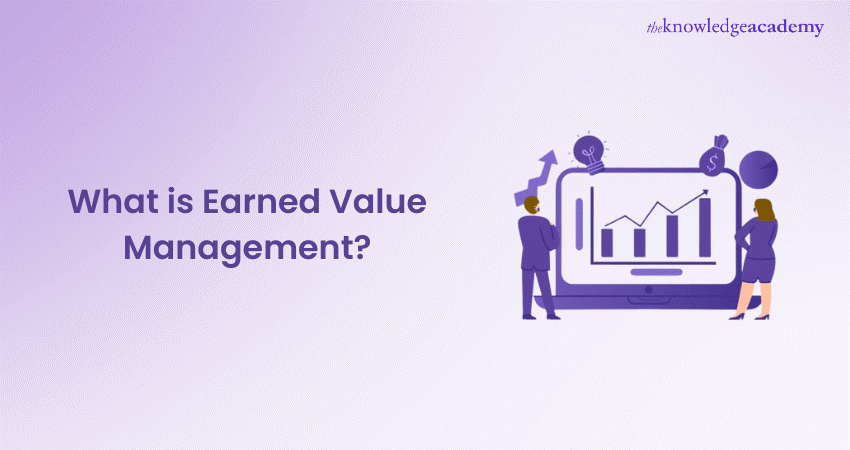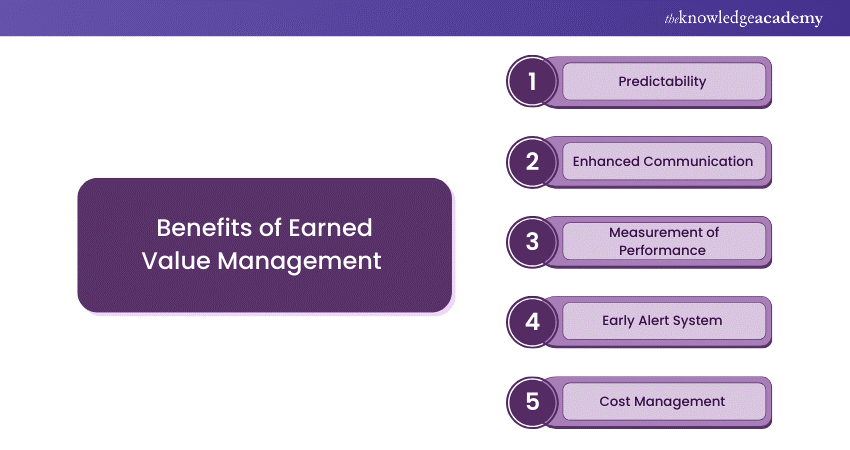We may not have the course you’re looking for. If you enquire or give us a call on +44 1344 203999 and speak to our training experts, we may still be able to help with your training requirements.
Training Outcomes Within Your Budget!
We ensure quality, budget-alignment, and timely delivery by our expert instructors.

Feeling lost at sea with your projects, unsure of progress and plagued by cost overruns? What is Earned Value Management (EVM) and how can it be your guiding lighthouse? EVM isn't just another Project Management tool; it's a comprehensive system that sheds light on performance. It helps you measure progress objectively, identify risks before they become disasters, and ultimately, steers your projects towards success.
Ready to transform your rudderless projects into high-achieving powerhouses? Dive deeper into this extensive blog and discover What is Earned Value Management and how can be your secret weapon for navigating the turbulent waters of Project Management.
Table of Contents
1) What is Earned Value Management (EVM)?
2) Essential Elements of EVM
a) Earned Value (EV)
b) Actual Cost (AC)
c) Planned Value (PV)
d) Analysis of Variances
e) Cost Performance Index (CPI)
3) Benefits of Earned Value Management (EVM)
4) Conclusion
What is Earned Value Management (EVM)?
Earned Value Management (EVM) serves as a method for assessing the performance and advancement of a project. It equips Project Managers with the means to make educated decisions throughout the project's duration. Project progress can be gauged in various ways, and it's common for managers to subjectively assign completion percentages to each task without a consistent methodology.
The downside to this approach is the variability in how progress is perceived, often influenced by conflicting motivations. Hence, the necessity for a standardised, established, and validated method becomes clear, ensuring objective and uniform progress assessment.
Here are some essential practices of EVM:
a) Creating a Performance Measurement Baseline (PMB): The PMB stands as the primary yardstick for gauging project progress. It’s a composite measure rooted in three critical dimensions: cost, time, and scope. By breaking down the project into manageable segments and assigning a time-bound budget to each, the PMB serves as a steadfast reference point to ensure the project’s adherence to its original trajectory.
b) Assessing Project Performance Against the PMB: Once the PMB is in place, it’s imperative to continually measure and scrutinise the project’s performance in relation to this benchmark. This involves monitoring resource utilisation, tracking the physical completion of tasks, evaluating cost and schedule efficiency, and identifying any project issues. Such ongoing analysis enables the Project Manager to take necessary actions to align the project execution with the established PMB.
Essential Elements of EVM
Now that we've understood the power of Earned Value Management (EVM), let's delve deeper. To effectively utilise EVM, several key elements work together to provide a clear picture of your project's health. Let’s explore the essential elements of EVM, unpacking each component and revealing how they contribute to informed decision-making throughout your project lifecycle.
1) Earned Value (EV)
Referred to as Budgeted Cost of Work Performed (BCWP), EV quantifies the worth of work accomplished at a specific juncture. It’s a metric of project progression in monetary terms. Calculating EV involves multiplying the completed work percentage by the project’s initial budget. This calculation enables managers to gauge the actual value gained against the PV and ascertain if the project is progressing faster or slower than anticipated.
2) Actual Cost (AC)
AC encompasses the total expenditures incurred for project work up to a certain point, including labor, materials, equipment, and overheads. Known as Actual Cost of Work Performed (ACWP), it’s essential for contrasting the real spending against the budgeted figures (PV and EV) to detect any discrepancies in costs.
3) Planned Value (PV)
Also known as Budgeted Cost of Work Scheduled (BCWS), PV is a fundamental element of Earned Value Management (EVM). It denotes the approved budget allocated for scheduled work by a certain milestone or date. Serving as a cost baseline, PV aids in assessing whether a project is on track with its time and financial objectives.
4) Analysis of Variances
This core EVM technique compares PV and EV against AC to identify deviations from the plan. Variance analysis discerns two variances: cost variance (CV) and schedule variance (SV), calculated as:
CV=EV−AC 𝐶𝑉=𝐸𝑉−𝐴𝐶
and
SV=EV−PV 𝑆𝑉=𝐸𝑉−𝑃𝑉
respectively. Positive CV suggests cost efficiency, while positive SV indicates a schedule ahead of plan.
5) Cost Performance Index (CPI)
CPI is a key indicator of cost efficiency within EVM, determined by the formula:
CPI=EVAC𝐶𝑃𝐼=𝐸𝑉𝐴𝐶
A CPI above 1 implies cost savings, below 1 indicates overspending, and a CPI of 1 signals adherence to the budget. Monitoring CPI allows for timely cost management interventions.
Master project performance with Earned Value Management Training – Begin your journey to expert status today!
Benefits of Earned Value Management
We've explored the nuts and bolts of Earned Value Management (EVM). But why should you incorporate this system into your Project Management toolbox? In the following points, we will dive into the tangible benefits of EVM, highlighting the advantages it offers for Project Managers and organisations.
Get ready to discover how EVM can transform your Project Management approach, boosting efficiency, improving communication, and ultimately, driving project success.

1) Predictability
EVM is a reliable method for predicting the direction and final outcomes of projects. By meticulously analysing both financial and schedule-related data, Project Managers can anticipate future developments and make strategic adjustments to project plans, ensuring a higher likelihood of success.
2) Enhanced Communication
EVM creates a standardised platform for communication regarding project status and performance. This common language enhances understanding and collaboration between Project Managers, their teams, and all stakeholders involved, leading to a more cohesive project environment.
3) Measurement of Performance
EVM provides a structured and quantifiable system for assessing the progress of a project. It enables Project Managers to keep a close watch on the project’s advancement relative to the planned benchmarks, allowing for the early detection of any variances that may occur.
4) Early Alert System
EVM functions as an early detection system, highlighting potential challenges at the onset of the project’s life. This foresight gives Project Managers the opportunity to address issues promptly, reducing the risk of project derailment and ensuring smoother progression.
5) Cost Management
EVM equips Project Managers with robust tools for effective cost oversight. It supports the vigilant monitoring of financial performance against the budget, identifying any deviations in spending. This proactive approach to cost management enables Project Managers to implement financial corrections swiftly, maintaining the project’s fiscal health.
Conclusion
So, ditch the guesswork and take control! By implementing EVM, you'll gain the insights needed to make informed decisions, optimise resource allocation, and ensure your projects reach their full potential. The path to Project Management mastery starts here – set sail with EVM today!
Embark on a journey to master project performance with the Earned Value™ Management Foundation and Practitioner Course – your pathway to becoming an EVM expert.
Frequently Asked Questions

Earned Value Management (EVM) tracks a project's progress by comparing planned work (schedule and budget) to actual work completed (earned value). It helps identify deviations and potential problems early on.

While powerful, EVM can be complex to set up and requires accurate data. It may not be ideal for small projects or those with constantly changing scopes.

The Knowledge Academy takes global learning to new heights, offering over 30,000 online courses across 490+ locations in 220 countries. This expansive reach ensures accessibility and convenience for learners worldwide. Alongside our diverse Online Course Catalogue, encompassing 17 major categories, we go the extra mile by providing a plethora of free educational Online Resources like News, Blogs videos, webinars, and interview questions. Tailoring learning experiences further, professionals can maximise value with customisable Course Bundles of TKA.

The Knowledge Academy’s Knowledge Pass, a prepaid voucher, adds another layer of flexibility, allowing course bookings over a 12-month period. Join us on a journey where education knows no bounds.

The Knowledge Academy offers various Earned Value Management Courses including the Earned Value™ Management Foundation and Practitioner Course, and the Earned Value™ Management Foundation Course. These courses cater to different skill levels, providing comprehensive insights into Operations Management
Our Project Management Blogs cover a range of topics related to Earned Value Management, offering valuable resources, best practices, and industry insights. Whether you are a beginner or looking to advance your Project Management skills, The Knowledge Academy's diverse courses and informative blogs have got you covered.
Upcoming Project Management Resources Batches & Dates
Date
 Earned Value™ Management Foundation & Practitioner
Earned Value™ Management Foundation & Practitioner
Mon 24th Feb 2025
Mon 16th Jun 2025
Mon 1st Sep 2025
Mon 1st Dec 2025







 Top Rated Course
Top Rated Course



 If you wish to make any changes to your course, please
If you wish to make any changes to your course, please


